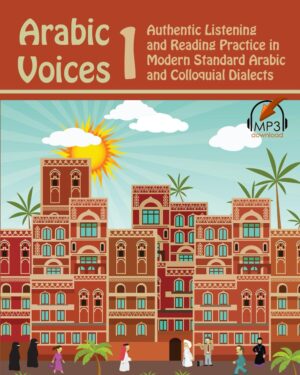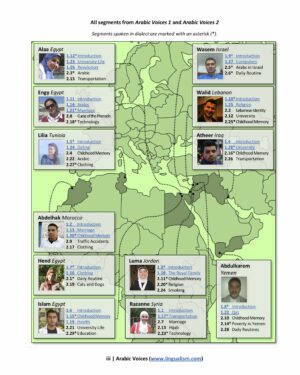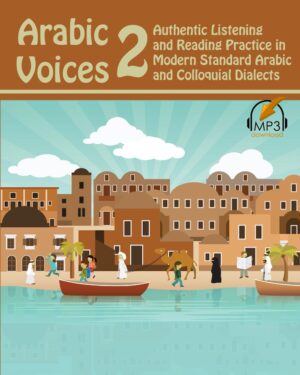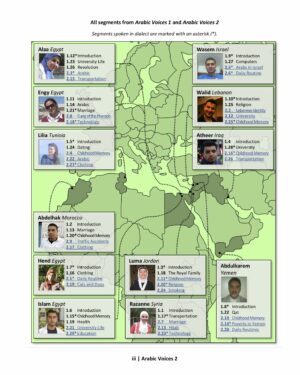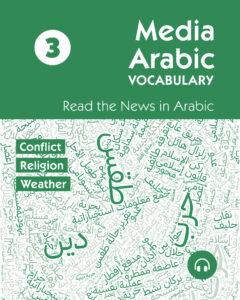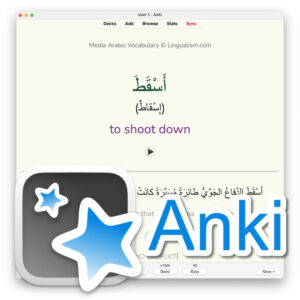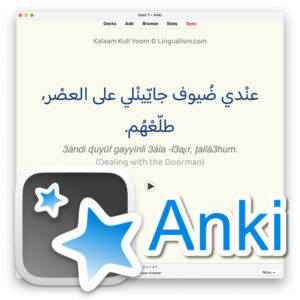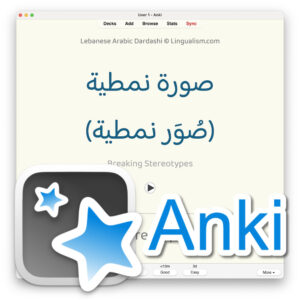Home » Modern Standard Arabic » Islam’s Self-Introduction
Islam’s Self-Introduction
| Greetings! [00:00] | السلام عليكم ورحمة الله وبركاته. | |
| Welcome to a new Arabic Voices video, your path to learning Arabic. [00:03] | أهلًا ومرحبًا بكم في فيديو جديد من فيديوهات Arabic Voicesطريقك لتعلم العربية. | |
| Today we will comment on what Islam said about his life, [00:11] | اليوم سنقوم بالتعليق عما قاله إسلام بشأن حياته، | |
| and we will explain some terms and concepts. [00:17] | وسنقوم بشرح بعض المصطلحات والمفاهيم، | |
| We will mention some of the various synonyms that we can use when we speak Arabic, [00:22] | وسنذكر بعض المرادفات المختلفة التي يمكننا أن نستخدمها عند حديثنا باللغة العربية، | |
| or also while writing in Arabic. [00:30] | أو كذلك في أثناء الكتابة باللغة العربية. | |
| Let's begin on page 29. Islam says, مرحبًا، أودّ أن أعرفكم بِنفسي (Hello, I would like to introduce myself to you). [00:34] | فهيا بنا نبدأ، وتحديدًا في الصفحة التاسعة والعشرون—يقول إسلام: (مرحبًا، أودّ أن أعرفكم بِنفسي). | |
| Islam says أود أن (I would like). This word is also explained in the book. You can use it to express your desire to do something. [00:47] | يقول إسلام: [أَودُ أن] وهذه الكلمة كما هو مشروح في الكتاب، يمكنك أن تستخدمها للتعبير عن رغبتك في عمل شيءٍ ما. | |
| You can also use أحب أن (I want to). أحب أن أعرفكم بِنفسي (I would like to introduce myself to you). [00:59] | يمكنك كذلك أن تستخدم [أُحِبُ أن]، (أُحِبُ أن أعرِفكم... أن أعرِفكم بنفسي)؛ (أود أن أُعرفكم بنفسي). | |
| You can use this term or that term, which Islam also used on line 8 when he said حقًا أحب أن أكون بالقرب من البحر (I really like to be near the sea.) [01:08] | يمكنك استخدام هذا المصطلح أو ذاك المصطلح، وهو ما استخدمه إسلام كذلك في السطر الثامن عندما قال: (حقًا أحب أن أكون بالقرب من البحر). | |
| أود أن (I would like to), أحب أن (I want to); you can use either one. [01:20] | [أود أن]، [أُحِبّ أن]؛ يمكنك استخدام أيًا منهما. | |
| Then Islam says on line 3: بِالأحْرى يجبُ أن أقول مضى من عمري عشرين عامًا (or rather, I should say I was twenty years old). [01:27] | بعد ذلك يقول إسلام في السطر الثالث: (أو بِالأحْرى يجِبُ أن أقول…) أو (بِالأحْرى يجبُ أن أقول مضى من عمري عشرين عامًا). | |
| يجبُ أن (must): This term means that you have to do something, so you can also use it, if you use لا بدّ أن. [01:41] | [يجبُ أن] وهذا المصطلح... يقول معناه أنه لا بدّ وأن تفعل شيءٍ ما، ولذلك يمكنك أن تستخدم كذلك [لا بدّ أن]، | |
| Whether you use يجبُ أن or لا بدّ أن, both are correct. You can use these two different terms. [01:54] | إذا استخدمت [يجب أن] أو [لا بدّ أن]، كلاهما صحيح؛ مصطلحين مختلفين، يمكنك استخدام أيًا منهما. | |
| You can also say بِالأحْرى لا بد أن أقول مضى من عمري عشرين عامًا (or rather, I should say I was twenty years old). [02:03] | فيمكن أن تقول كذلك (أو بالأحْرى، لا بدّ أن أقول مضى من عمري عشرون عامًا). | |
| يجب أن أقول and لا بدّ أن أقول (I must say) are both correct. [02:12] | (يجب أن أقول)، (لا بدّ أن أقول)؛ كلاهما صحيح. | |
| After that, Islam says on line 5... and this is a quick reminder about what we actually said earlier. أسكن في مصر... في شمال مصر (I live in Egypt... in northern Egypt); [02:18] | بعد ذلك، يقول إسلام في السطر الخامس، وهذا تذكير سريع عن... بشأن ما قلناه من قبل بالفعل (أسكن في مصر... في شمال مصر)؛ | |
| أسكن، أقطُن، أقيم in Egypt; We explained this when we spoke about what Abdelhak said. [02:33] | [أسكن]، [أقطُن]، [أقيم] في مصر؛ وهذا كنا قد شرحناه عندما تحدثنا عما قاله عبد الحق. | |
| Abdelhak used أقطُن في المغرب (I live in Morocco). [02:41] | عبد الحق استخدم [أقطُن] في المغرب. | |
| Here, we say أسكُن (I live), or Islam says أسكُن في مصر (I live in Egypt). [02:46] | هنا نقول أسكن أو يقول إسلام [أسكُن] في مصر. | |
| You can say أقيم في مصر (I live in Egypt). [02:52] | يمكنك أن تقول [أقيم] في مصر. | |
| أقيم، أسكن، أقطُن All are correct. [02:54] | [أقيم، أسكن، أقطُن] أيًا منهما صحيح. | |
| Great! Then we turn to what Islam said on line 9. Islam says فأحيانًا أذهب للسباحة، أحيانًا فقط أجلس لمشاهدة البحر (Sometimes I go swimming, and sometimes I just sit to watch the sea). [02:58] | عظيم! ننتقل بعد ذلك إلى ما قاله إسلام في السطر التاسع—يقول إسلام: (فأحيانًا أذهب للسباحة، أحيانًا فقط أجلس لمشاهدة البحر). | |
| Islam uses here the adverb of time أحيانًا (sometimes), and this word indicates that Islam does this action only some of the time, not all of the time. [03:14] | يستخدم إسلام هنا [ظرف الزمان—أحيانًا]، وهذه الكلمة تشير إلى أن إسلام يقوم بأداء هذا الفعل بعض الوقت فقط، وليس طوال الوقت. | |
| So, maybe Islam swims two or three times a week, for example. That is أحيانًا (sometimes). [03:28] | فربما يقوم إسلام بالسباحة مثلًا مرتين في الأسبوع أو ثلاث مرات في الأسبوع هذا يكون [أحيانًا]. | |
| If you do something some of the time, you say أحيانًا (sometimes). [03:36] | وإن قمت بأداء شيءٍ ما بعض الوقت تقول [أحيانًا] .. | |
| "Sometimes". And if you are doing it all the time, every day, for example, you say دائمًا (always). [03:45] | [أحيانًا]؛ أما إن كنت تقوم به طوال الوقت، كل يوم مثلًا، فأنت تقول [دائمًا]. | |
| [Always] That's all the time. [03:53] | [دائمًا] وهذا طوال الوقت. | |
| أحيانًا and بعض الوقت (sometimes). دائمًا and طوال الوقت (always) And this is what Islam says in the next line, line 10: [03:55] | ف[أحيانًا—بعض الوقت]، [دائمًا—طوال الوقت]وهذا ما استخدمه إسلام في السطر التالي، في السطر العاشر يقول: | |
| فالبحر يشعرني دائمًا بالأمان (The sea always feels safe.); The word دائمًا (always) is another adverb of time, [04:05] | (فالبحر يشعرني دائمًا بالأمان)؛ فكلمة [دائمًا] هنا [ظرف زمان] آخر، | |
| but it indicates that this thing occurs all the time. أحيانًا and بعض الوقت (sometimes). دائمًا and طوال الوقت (always). [04:11] | ولكنه يدل على أن هذا الشيء يحدث طوال الوقت، [أحيانًا—بعض الوقت]؛ [دائمًا—طوال الوقت]. | |
| But if something happens once a month, for example, if Islam swims every... once a month, for example, or... or once every two months, then you can say نادرًا (rarely). [04:23] | أما إن كان شيء يحدث يعني مرة كل شهر مثلًا، يعني إن كان إسلام يقوم بالسباحة كل... مرة... كل شهر مثلًا أو... أو مرة كل شهرين فها... فيمكنه أن يقول [نادرًا]. | |
| نادرًا (rarely) is if the thing happens only once in a while. [04:37] | [نادرًا] وهذا إن كان الشيء لا يحدث إلا مرة كل حين. | |
| دائمًا is all of the time, أحيانًا is some of the time, and نادرًا is very, very, very little. [04:44] | ف[دائمًا—طوال الوقت]، [أحيانًا—بعض الوقت]، [نادرًا—قليل قليل قليل جدًا]. | |
| Great! Let's move on to something else Islam mentioned on line 19. [04:53] | عظيم! هيّا ننتقل إلى شيءٍ آخر ذكره إسلام في السطر التاسع عشر بالتحديد، | |
| Islam says: وبالطبع والدتي أيضًا، فهي أيضًا ربة منزل ممتازة والتي أشعر بالفخر كونها والدتي (And of course my mother too; she is also an excellent housewife and that I feel proud of her being my mother). [05:04] | يقول إسلام : (وبالطبع والدتي أيضًا هي... وبالطبع والدتي أيضًا، فهي أيضًا ربة منزل ممتازة والتي أشعر بالفخر كونها والدتي). | |
| أشعر بالفخر (I feel proud). This verb... when you use the verb أشعر (I feel), you use the preposition بِـ bi- [+ noun] after it to describe what you feel. [05:20] | [أشعر بالفخر]، فهذا الفعل... الفعل [أشعر] عندما تستخدمه، تستخدم الح... حرف [ الباء] بعده لتصف ما تشعر به، | |
| أشعر بالفخر (I feel proud), أشعر بالأمان، (I feel safe), أشعر بالراحة (I feel comfortable), and so on. [05:33] | (أشعر بالفخر، أشعر بالأمان، أشعر بالراحة)، وهكذا. | |
| When you use the verb أشعر (I feel), you use the preposition بِـ bi- to describe how you feel, (I feel comfortable, I feel safe, I feel proud), and so on. [05:41] | عندما تستخدم الفعل [أشعر]، تستخدم بعده حرف [ الباء] لوصف شعورك، (أشعر بالراحة، أشعر بالأمان، أشعر بالفخر)، وهكذا. | |
| Remember to use بِـ bi- after this verb. [05:56] | تذكر أن تستخدم [الباء] بعد هذا الفعل. | |
| Great ! Then Islam says on line 20: لديّ أخ واحد وأربعة من الإخوة البنات (I have one brother and four sisters). [06:01] | عظيم! بعد ذلك يقولإسلام في السطر العشرون: (لديّ أخ واحد وأربعة من الإخوة البنات). | |
| لديّ أخ واحد (I have one brother). Islam uses the word لديّ (I have) here. You can also use the word عندي (I have) [06:14] | (لديّ أخ واحد)، يستخدم إسلام هنا كلمة [لديّ]، يمكنك كذلك أن تستخدم [عندي]. | |
| لديّ أخ or عندي أخ (I have a brother), both are correct. لديّ أخ or عندي أخ [06:22] | (لديّ أخ)، (عندي أخ)، كلاهما صحيح؛ [لديّ] أو [عندي]. | |
| on line 26, Islam says–and this is explained in the book: أرجو أن أكون هناك ذات يوم من الأيام (I hope to be there one day). [06:29] | في السطر السادس والعشرون، يقول إسلام هنا—وهذا مشروح في الكتاب: (أرجو أن أكون هناك ذات يوم من الأيام). | |
| You can use أرجو أن (I wish that...) or أتمنى أن (I hope that...) or أطمح أن (I aspire to...), أتطلع إلى (I look forward to...), آمل أن (I hope to...)... [06:42] | يمكنك أن تستخدم [أرجو أن]، [أتمنى أن]، [أطمح أن]، [أتطلع إلى]، [آمل أن]، [أرجو أن]، [آمل أن]، [أتمنى أن]، | |
| and of these different structures can be used to express your desire for something or that you hope something: أرجو أن or آمل أن or أتمنى and so on. [06:57] | أيًا من هذه الصيغ المختلفة يمكنك أن تستخدمها للتعبير عن رغبتك في أداء شيءٍ ما أو أنك تتمنى شيءٍ ما، [أرجو أن]، [آمل أن]، [أتمنى] وهكذا... | |
| This is explained in detail later in the book. [07:13] | وهذا مشروح بالتفصيل في الكتاب لاحقًا. | |
| After that, we finally want to take a look at what Islam used as a conjunction between what he says and... or what he said and what he said after that, and after that, and after that; and... [07:18] | بعد ذلك، وأخيرًا نريد أن نعقب عما استخدمه إسلام كأداة للربط بين ما يقوله و… أو ما قاله و ما يقوله بعد ذلك، وبعد ذلك، وبعد ذلك؛ وهذا و... | |
| And this ... this connector is the word كذلك or وكذلك (also). [07:34] | وهذه ...أداة الربط هذه هي كلمة [كذلك] أو [وكذلك]. | |
| Islam has used it in more than one place during his talk. on line 31, Islam says وكذلك أحب تنس الطاولة أو كما يُسميها البعض البينج بونج (I also love table tennis or as some call it ping pong.) [07:40] | وقد استخدمها إسلام في أكثر من موضع أثناء حديثه، ففي السطر الواحد والثلاثون—يقول إسلام: (وكذلك أحب تنس الطاولة أو كما يُسميها البعض البينج بونج) وهكذا... | |
| He says وكذلك أحب (I also love...). وكذلك (also) is used to add something else to your words or to you're saying. [07:58] | فيقول: (وكذلك أحب…) [وكذلك]، وكلمة [وكذلك] تستخدمها لإضافة أمر أخر إلى كلامك أو إلى حديثك. | |
| He also uses it on lines 3 and 4: كذلك لا أحب تناول الأسماك (Also, I do not like eating fish). [08:10] | يستخدمها كذلك في السطر الرابع والثلاث... والثلاثون وهو يقول: (كذلك لا أحب تناول الأسماك). | |
| He also uses it on line 35. He says أرجو أن أكون في يوم من الأيام مصدر فخر لأهلي ولوطني وكذلك ديني (I hope that one day I will be a source of pride for my family, my homeland and my religion.) [08:18] | يستخدمها كذلك في السطر الخامس والثلاثون فهو يقول: (أرجو أن أكون في يوم من الأيام مصدر فخر لأهلي ولوطني وكذلك ديني). | |
| When he adds anything new, he uses the word كذلك or وكذلك (also). [08:31] | فعندما يضيف أي أمر جديد يستخدم كلمة [كذلك]، [وكذلك]. | |
| I also use it in my conversation. I have just done so. [08:36] | أنا أيضًا أستخدمها كذلك في حديثي، لقد قلت كذلك لتوي. | |
| وكذلك means "in addition to" something else, that is, when I add something to something else, I start talking and I add another thing, and I sayكذلك or وكذلك (and also). [08:42] | وكذلك بالإضافة إلى شيءٍ آخر يعني عندما أضيف أمر إلى أمرٍ آخر، أبدأ الحديث وأضيف أمر آخر أقول [كذلك]، [وكذلك]. | |
| I would like to point out here briefly the difference between Arabic and English in the use of such words when connecting a sentence with another sentence and when connecting two things. [08:55] | وأودّ الإشارة هنا سريعًا إلى الإختلاف بين اللغة العربية واللغة الإنجليزية في استخدام مثل هذه الكلمات عند الربط بين جملة وجملة أخرى والحديث بين أمر وأمر آخر. | |
| We often use the Arabic language to start the sentence with a connector, which is the opposite of what ... [09:10] | غالبًا... غالبًا ما نستخدم في اللغة العربية نبدأ الجملة بأداة ربط، وهو عكس في ما... | |
| ... what is the situation is in English. You start your conversation directly by mentioning... the noun, [09:18] | ما هو الوضع في اللغة الإنجليزية، فأنت تبدأ حديثك مباشرة بذكر الإس... الاسم، | |
| but if you notice in Arabic, we often use a connector. We say, for example وكذلك or وكذلك or بالإضافة إلى ذلك. [09:24] | ولكن إن لاحظت في اللغة العربية، غالبًا ما نستخدم أداة ربط فنقول مثلًا [و، كذلك، وكذلك، بالإضافة إلى ذلك]. | |
| If you look at what Islam has said, you can see many examples of this rule. He says: "And I do blah blah...", "And also, ..." "Also, ...". [09:34] | فإذا نظرت إلى ما قاله إسلام، يمكنك أن ترى أمثلة كثيرة لهذه القاعدة، فهوغالبًا يقول: (وأفعل كذا؛ وكذلك؛ كذلك). | |
| Generally, we always use connectors in our conversation. We start most sentences with these connectors. [09:50] | فغالبًا ما نستخدم أدوات الربط دائمًا أثناء حديثنا، نبدأ معظم الجمل بأدوات ربط نقول... | |
| We use و (and), فَـ (so), كذلك (also), وكذلك (and also), or any other connector. [10:00] | نستخدم حرف [ الواو] أو[الفاء] أو كلمة [كذلك]، [وكذلك]؛أو أي أداة ربط أخرى. | |
| This was our commentary on what Islam said. I hope that you have benefited from this commentary. [10:08] | فهذا كان تعليقنا عمّا قاله إسلام، وأتمنى أن تكونوا قد استفدتم من هذا التعليق. | |
| See you again, God willing, and we will comment on what Arabic speakers say in Arabic Voices. [10:18] | إلى لقاءٍ آخر إن شاء الله، نقوم فيه بالتعليق عمّا يقوله متحدثو اللغة العربية في كتاب Arabic Voices. | |
| Good bye! [10:27] | ألقاكم على خير بإذن الله. | |
| Thank you very much. May peace and God's mercy and blessings be upon you. [10:29] | أشكركم شكرًا جزيلًا، والسلام عليكم ورحمة الله وبركاته. |
Video Lessons
Arabic Voices MSA Lessons
Arabic teacher Mostafa Ahmed takes us through segments in MSA from Lingualism's book Arabic Voices 1: Authentic Listening and Reading Practice in Modern Standard Arabic and Colloquial Dialects, explaining interesting points of grammar and vocabulary.

